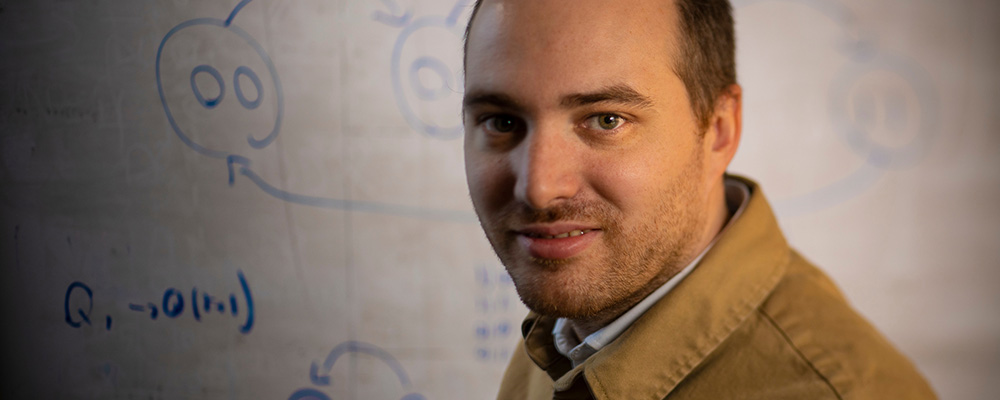Research
Science and Technology
Harnessing AI to catch those pesky software bugs
Anna Schmidt - 9 January 2023

How do you describe your work to people in one or two sentences?
We’ve all experienced software bugs, from Windows blue screen to phone app crashes. I help software developers build high-quality software, including software that automatically detects and fixes bugs. My goal is to use AI to “hunt” these software bugs and help developers fix them as early as possible.What did you want to be when you were in Grade 3?
I’ve always wanted to work with computers. My father had a computer at home for his work and I loved to break it apart to look inside.When did you know you wanted to be an engineer?
My brother was an engineer, so as a kid I already wanted to be an engineer, without even really knowing what it was. I’ve always loved understanding and building things, so it came naturally to me.What’s one big problem you want to address through your work?
Everyone would complain if a car sometimes displayed the speed incorrectly. Yet with software, our expectations are much lower and we tolerate a lot of problems. This matters, because software is used in critical domains. We need to raise the bar of what we consider acceptable quality with new methods, tools and solutions. My research and teaching goals are to develop techniques that put quality at the centre of software development and increase reliability.What’s your favourite thing so far about Augustana?
I love that it is a tiny campus. I get to know my students well and, equally important, I get to know many faculty members and employees I would rarely talk to at a larger university. Coming from a university with a large computer science department, it’s refreshing to meet people outside my field. I enjoy learning new things on topics that would never even cross my mind otherwise, such as professor Mélanie Méthot’s work on bigamy in Australia!How do you see the Augustana community playing a role in your work?
One of the larger up-and-coming issues in my research field is fairness in software and AI. For a long time, the software engineering community focused on developing better methods and didn’t fully consider fairness issues that could be in the software we build. Now, working at a liberal arts and science campus, I can lean on my colleagues in fields where fairness has been extremely important for years. Working with them will be a big help in tackling fairness issues in software.What’s the best advice you’ve ever received?
If a submitted article was rejected or a research project went nowhere, my former supervisor would say, “If you don’t fail, you’re not trying hard enough.” It’s important in academia and research to embrace and accept our “failures.” We are doing work at the edge of science, so we can expect most of it to fail. In today’s society, we only see people’s successes, but every success is built on failures we conveniently forget about.What’s the worst fashion or hair decision you’ve made?
I tried to have long hair a few years ago. It didn’t go well. I’m glad I have almost no pictures of that time!What’s the last show you binge-watched and loved?
I don’t really binge watch anything, but I’ve been watching The Lord of the Rings: The Rings of Power. I’m a big Lord of the Rings fan, so I really enjoyed going back to this world — the scenery and the new interpretation of a story I love.What’s the best book you’ve ever read?
That’s a tough one. My favorite author is Robin Hobb. I loved her Farseer Trilogy. I especially love the way she writes her characters and how they change and evolve. But my favourite book is a French novel, La Horde du Contrevent by Alain Damasio. It’s hard to translate into English but it’s really good.Where did you grow up and what do you love about your hometown?
I grew up in Angers, France. It’s basically a walking museum, with castles, old mines and ancient Roman and Celtic settlements. Many streets have small “secret” historical places that can only be explored if you know they’re there.If you had unlimited time and resources, what’s your dream project in your field?
I would love to study a professional software developer’s brain with remote medical imaging (RMI) while they build software. The gap between experienced software developers and beginners is hard to qualify. “Good” software development is often considered an art. With RMI, I could study the differences in brain activity. This could help us teach the less understood parts of software development. I would also love to understand how hackers think, as the mindset to hack software often requires thinking entirely outside the box.–
More about Thibaud Lutellier
I am an assistant professor in the Department of Science at Augustana Campus. Before joining Augustana, I worked as a postdoctoral fellow at the University of Waterloo, where I received my PhD and MSc degrees. My research lies at the crossroads of software engineering and artificial intelligence, with a focus on using AI to help software developers build high-quality software.